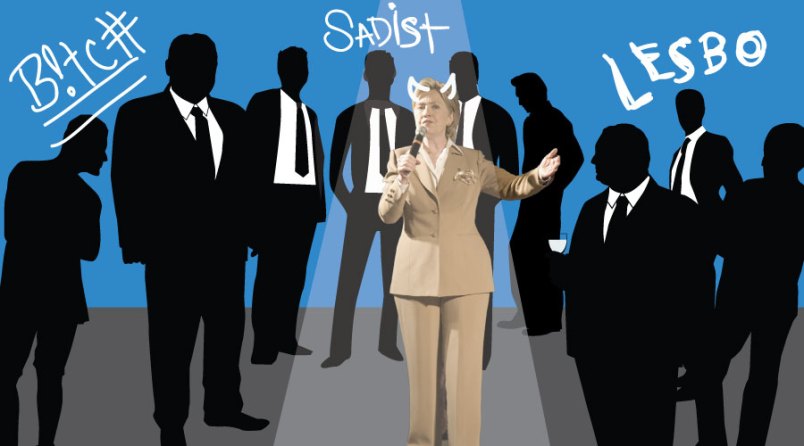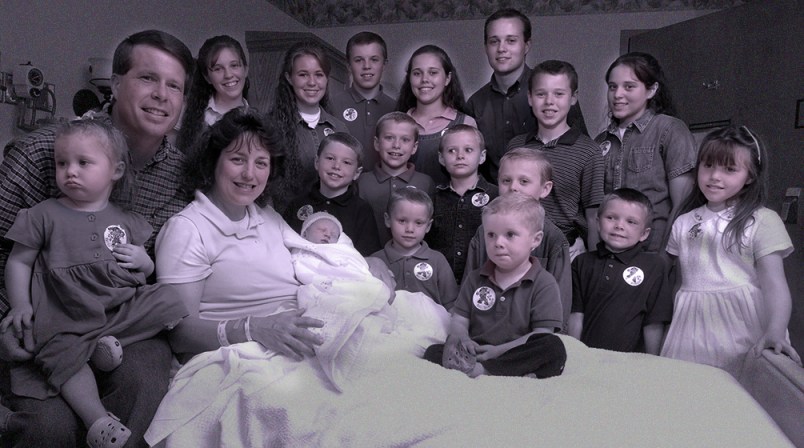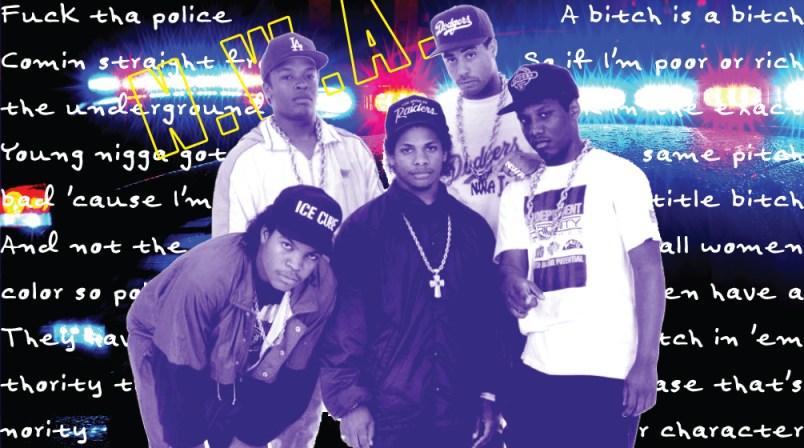Here’s what happened the last time Hillary Clinton ran for president: she drove men wild. Well, certain men. Especially certain men on the right. You could recognize them by the flecks of foam in the corners of their mouths when the subject of her candidacy arose. And they’re already girding themselves for the next time around, because there’s something about Hillary that just gets them all worked up.
But what exactly? Despise her they do, yet they’re also strangely drawn to her, in some inexplicably intimate way. She occupies their attention. They spend a lot of time thinking about her—enumerating her character flaws, dissecting her motives, analyzing her physical shortcomings with a penetrating, clinical eye: those thick ankles and dumpy hips, the ever-changing hairdos. You’d think they were talking about their first wives. There’s the same over-invested quality, an edge of spite, some ancient wound not yet repaired. And how they love conjecturing upon her sexuality! Or lack of, heh heh. Is she frigid, is she gay? Heh heh. Yes, they have many theories about her, complete with detailed forensic analyses of her marriage, probably more detailed than their thoughts about their own.
My point is that you can tell a lot about a man by what he thinks about Hillary, maybe even everything. She’s not just another presidential candidate, she’s a sophisticated diagnostic instrument for calibrating male anxiety, which is running high. Understandably, given that the whole male-female, who-runs-the-world question is pretty much up for grabs.
As our tour guides into these subterranean psychical thickets, I’ve enlisted a selection of Hillary’s right-wing biographers to lead the way, or more specifically, a selection of authors obsessed enough to write entire books about a woman they detest while still being lucid enough to find a commercial publisher. Unfortunately this excluded self-published works like Hillary Clinton Nude: Naked Ambition, Hillary Clinton And America’s Demise by Sheldon Filger, but even the painfully repetitious title screamed for the interventions of a professional editor, and life is short. I also declined to read any books that came with voodoo dolls; sadly this ruled out The Hillary Clinton Voodoo Kit: Stick It to Her, Before She Sticks It to You! by Turk Regan, but as fuming tirades were in no short supply, I felt that I could afford to be choosy.
Biographies, even bad ones, are the record of a relationship: temporary marriages, so to speak. More than a few self-reflective biographers have admitted as much. And for whatever reasons, Hillary seems to attract a certain type of husband: guys with a lot of psychological baggage, emotional intensity, and messy inner lives.
Let’s begin with Emmett Tyrrell, Jr., author of Madame Hillary: The Dark Road to the White House, since if Hillary’s biographer-foes sound like embittered ex-husbands, in Tyrrell, founder and editor-in-chief of the far-right American Spectator, we’re fortunate to have a biographer who’s occasionally mused in print about his actual ex-wife. So who gets it worse—Hillary or the ex? Actually it’s a toss-up. Who would have predicted: coincidentally it turns out that Madame Tyrrell and Madame Hillary share an uncanny number of similar traits. Hillary’s a self-righteous, self-regarding narcissist, “a case study in what psychiatrists call ‘the controlling personality,” and assumes the world will share her conviction that she’s always blameless. Compare with Tyrrell on the soon-to-be-ex, from his political memoir The Conservative Crack-Up: “She resorted to tennis, then religion, and then psychotherapy. Finally she tried divorce—all common American coping mechanisms for navigating middle age.” When Tyrrell worries that suburban women will secretly identify with Hillary’s independence and break from their husbands’ politics in the privacy of the voting booth, clearly suburban women’s late-breaking independence is territory he has cause to know and fear.
Hillary’s disposition is dark, sour, and conspiratorial; she has a paranoid mind, a combative style, is thin-skinned, and “prone to angry outbursts.” Whereas the ex-Mrs. T., we learn, was afflicted with “random wrath”; and as divorce negotiations were in their final stages, threatened to make the proceedings as public and lurid as possible. Hillary has “a prehensile nature,” which makes it sound like she hangs from branches by her feet. (Tyrrell has always fancied himself a latter day Mencken, flashing his big vocabulary around like a thick roll of banknotes.) And while he nowhere actually says that his ex-wife hung from branches by her feet, the reference to protracted divorce negotiations probably indicates that “grasping”—the definition of prehensile (I had to look it up)—is a characterization he wouldn’t argue with. When Tyrrell writes of Bill and Hillary that there was an emotional side to the arrangement, with each fulfilling the other’s idiosyncratic needs, as we see, he’s been there himself.
Threatening ex-wives, property settlements, bad breath—not exactly lighthearted stuff. Tyrrell at least tries to be amusing about it, in the sense that love transformed into hatred can be amusing, in a bilious, horribly painful sort of way. Not so with Edward Klein, author of the bestselling The Truth About Hillary, and a tragically humorless type. When Klein rants, “As always with Hillary, it was all about her,” note the rancid flavor of marital over-familiarity—he’s really just had it with her. He’s practically venomous. Though he’s also so suspicious of her sexual proclivities that unintentional humor abounds: he’s like an angry Inspector Clouseau with gaydar. The inconvenient fact that there’s no particular evidence Hillary bends that way dissuades him not.
Thus we learn that Hillary went to a college with a long tradition of lesbianism (Wellesley), where she read a lot of lesbian literature, and two of her college friends would later become out-of-the-closet lesbians, and later, some of her Wellesley classmates were invited for “sleepovers” to the White House? (Get it? Sleepovers.) In 1972, a Methodist church magazine she subscribed to published a special issue on radical lesbian and feminist themes edited by two—you guessed it—lesbians. In college, her role models were feminists who refused to wear pretty clothes, and sometimes appeared mannish; her White House Chief of Staff was also mannish looking. Though according to Klein, Hillary never much liked sex to begin with. Sounding like a Monty Python rendition of a Freudian analyst, Klein speculates about a fight Hillary once had with a college boyfriend about not wanting to go skiing; skiing, say Klein, “might have been a substitute for an honest discussion about her sexual frigidity.” The episode ended with Hillary retreating into “icy silence.” Get it? Icy. (He also quotes Richard Nixon, of all people, who says that Hillary is “ice cold.”)
Yet Klein reports that Hillary had a torrid affair with Vince Foster, the deputy White House counsel (and her former law partner) who later committed suicide. This would make her a frigid closeted bisexual adulteress, for anyone keeping track.
If it’s a handy truism that constant sexual innuendos mask a discomfort with sex, then Klein is one uptight dude. But there’s so much sexual angst among these guys generally, along with quite mixed feelings about the female body itself. When Klein writes of Hillary’s lower regions that though she’s “a small-boned woman from the waist up, she was squat and lumpy from the waist down, with wide hips, calves, and ankles,” the blatant bodily aversion in the phrase “squat and lumpy” isn’t just a disagreement with her health care plan. Klein’s concentration on Clinton’s physical appearance is so microscopic that you fully expect to turn the page and find an index of her moles, accompanied by a close reading of what they indicate about her moral insufficiencies.
None of this is exactly a testimonial to his deep self-acuity. Or very attractive propensities in a man, it must be said. Though maybe he’s unconsciously identifying when he writes that Hillary had “always thought of herself as an ugly duckling,” and particularly hated her body, which caused her to neglect her personal appearance as a young woman, and go around dressed like a hippie in shapeless clothes, and with hair that looked like it hadn’t been washed for a month. Or secretly commiserating about her feeling “so hopelessly unattractive that she did not bother to shave her legs and underarms, and deliberately dressed badly so she would not have to compete with more attractive women in a contest she could not possibly win.” I feel compelled to note, if we’re going down this path, that—having seen a few photos of the author—this is a man who can’t have felt entirely secure about his competitive mettle on this score either.
Hillary’s physicality really does loom large for her biographers. Tyrrell too spends many passages mocking her youthful hairdos, down to the thick eyebrows which once “would have collected coal dust in a Welsh mining village.” In other words, she’s an overly hairy woman, in addition to everything else. Hairdo, eyebrows—thankfully we’re not privy to data on the condition of her bikini line. Tyrrell sounds like an aspirant for the Vidal Sassoon endowed chair on the Clinton-hating Right when he concludes that Hillary’s “search for the perfect hairstyle has finally been resolved into a neatly elegant businesswoman’s coiffure” and that she “seems to have turned her hair into a major strength.” He also concedes that Hillary “flirts well” and has evolved into “a handsome woman.” Klein gets in a few digs on this point himself, as you’d expect, benevolently mentioning that Hillary’s the kind of homely woman whose looks have improved with age, then trotting out another anonymous medical expert to testify that she’s been “Botoxed to the hilt.”
No, Hillary doesn’t exactly elicit the best in her foes. On the sexual creepiness meter, Klein gets some stiff competition from Carl Limbacher, who writes for the far-right news outlet NewsMax and is the author of Hillary’s Scheme: Inside the Next Clinton’s Ruthless Agenda to Take the White House. Here’s another biographer a little too keen to nose out the truth about Hillary’s sexuality: Bill Clinton is a predator, Hillary digs it, and this is the key that unlocks her character. If Hillary didn’t literally hold down the victims while Bill did the deed, she was complicit nonetheless—“a victimizer who actually enabled her husbands predations,” since “a woman with half the intellect of Hillary Clinton would understand that she’s married to a ravenous sexual predator at best—a brutal serial rapist at worst.” At least he compliments her intellect. I’m dying to know what Limbacher imagines Hillary’s wearing when he fantasizes about her in the henchwoman-to-rape role—her Ilsa, She-Wolf of the SS outfit or the navy blue pantsuit.

As we see, the problem for Hillary’s biographers isn’t that a woman’s aspiring to be president—none of them mount an actual argument against women as presidential candidates. The problem is that Hillary’s a deformed woman. She’s a sadist, a victim, asexual, a dyke—maybe all at once.
Taking the measure of Hillary’s perverted femininity also preoccupies John Podhoretz in Can She Be Stopped: Hillary Clinton Will Be the Next President of the United States Unless… On the one hand, Podhoretz wants to like Hillary, even though he finds her tough to warm up to as a woman: she never figured out what to do with her hair and clothes, in his diagnosis, she isn’t a raving beauty, and her manner is almost pathologically unsexy. Interestingly, Podhoretz thinks this anti-feminine quality may actually work in her favor: being “neither girlish nor womanly” with a “hard to describe style” could be the perfect blend for the first woman president, he muses, since a president has to be a little scary, not seem emotional—basically she should be an unlikable bitch. “And Hillary is a bitch.” Feigning worry that saying this kind of thing makes him sounds sexist—while clearly admiring himself for saying it—he explains that a woman presidential candidate needs to show she can be manly, and if any woman politician can pass for a tough guy, it’s Hillary. This scares him, though in a sweaty, enthralled sort of way. Call him Mr. Conflicted.
But maybe inner maelstroms come with the territory when Mom is the ultra-conservative doyenne and fiery anti-feminist, Midge Decter, author of numerous books denouncing the women’s movement and the dupes who fell for it. Dad is the notoriously pugnacious neo-con, Norman. When Podhoretz says, incoherently, that Hillary had an “easy path due in part to feminism,” he sounds like the dutiful son, channeling Midge. What mother could ask for more? But things can’t have been easy for John: between the powerhouse mom, the romantic impetuosities and flip-flops, and the politically strange-bedfellows current marriage (though I’m sure they’re a lovely couple), Podhoretz has more than his share of family baggage when it comes to love and politics. As has Hillary herself, needless to say—in a better world the two of them could have a fascinating heart-to-heart on the subject.
Instead, Podhoretz spends a good chunk of his book proffering weird advice to Hillary on how to position herself to win the election, even while bashing her senseless at every turn. Example: to avoid being upstaged by Bill, Hillary should treat him “as though he were her father—there to provide her with emotional support and little else.” Here we pause to note that Podhoretz is someone whose career has always been upstaged by his more famous father. How can the reader keep her footing amidst this mad swirl of relatives, husbands, ambitions, and projections?
By the way, Emmett Tyrrell has some free advice for Hillary too: she should get herself a divorce, and pronto. Since Bill is not only goatish but also “ithyphallic” (I had to look that up too), Hillary could present herself to women voters as “a victim of the male penile imperative,” then start dating again. I imagine Tyrrell is so pro-divorce because his own life improved so dramatically following one, especially on the penile imperative front. His fans will doubtless recall Tyrrell’s bubbly reports about life as a swinging bachelor, picking up “terrific co-eds” at various right-wing think-tank shindigs, and not returning home alone. Yes, conservatives do score, as Tyrrell—who charges Hillary with having been too self-disclosing in her memoir, Living History—makes sure to let us know. His preference is for the “soignée” and “physiologically well-appointed,” though unfortunately one of his soignée dates is mistaken for a hooker when he drops by a conservative gathering at the Lehrman Institute on his way to Au Club, a then-happening Manhattan nightspot. (A friend explains that when a conservative shows up somewhere with a beautiful woman, he’s usually paying by the hour.)
Tyrrell has actually been quite the gallant about aging female Republicans in the past, waxing lyrical about right-wing sex kitten Phyllis Schlafly’s foxiness and Nancy Reagan’s large beautiful eyes, both of whom are perhaps a quarter century his senior—to which one can only say, “You go, Bob.”
But could he ever go for a Democrat? As most agree, Hillary’s aging well, and Tyrrell hasn’t been entirely critical. On the plus side, she reminds him of Madame Mao, the “white boned demon” who was never more dangerous than when wearing a seductive guise, and Tyrrell is on record as a man who likes a seductive guise. However, in an exceedingly strange passage toward the end of the book, we learn that Hillary’s ultimate dream is to be commandant of a “national Cambodian re-education camp for anyone caught wearing an Adam Smith necktie or scarf.” Or perhaps it’s also an extermination camp, since he adds: “Welcome to Camp Hillary. Please remove your glasses and deposit them on the heap. (Was that a flash of gold I saw in your teeth?)” Yes, it’s off to the killing fields for Tyrrell and his kind—having received her political education at the feet of Pol Pot, it’s definitely curtains for the bourgeois enemy once Hillary takes the reins. I think Tyrrell means all this to be witty. He concludes by telling readers he’s “taking the high road, since hatred is an acid on the soul.”
Here we’ve entered the realm of male hysteria, where reason and intellect go to die, though Tyrrell can be a hoot for those who find this kind of thing entertaining.
Speaking of male hysteria brings us to the case of Tyrrell’s protégé at the American Spectator, David Brock, and his biography, The Seduction of Hillary Rodham. After receiving a million dollar book advance to write a smear job on Hillary similar to the one he’d previously performed on Clarence Thomas accuser Anita Hill (Brock was famously the author of the “a bit nutty and a bit slutty” line about Hill), a strange thing happened when he tried to plunge the dagger again. Somehow he couldn’t. Sure there was the stuff about the 60s radicalism that Hillary never really abandoned, including a catty analysis of her college wardrobe. And like the rest, he spends pages enumerating her bodily crimes and misdemeanors: given her thick legs she adopted the sort of “loose-fitting, flowing pants favored by the Viet Cong” (just call her Ho Chi Rodham); along with these, she sported white socks and sandals (here, even I must protest), wore no makeup, piled her hair on top of her head, and “came from the ‘look-like-shit school of feminism.’” Even once ensconced in the professional world she cut a “comic figure” with her hair fried into an Orphan Annie perm and a “huge eyebrow across her forehead that looked like a giant caterpillar.”
But more of the time it’s an intermittently compassionate portrait of a gawky, brainy, well-intentioned Midwestern girl swept off her feet by a charismatic Southern charmer, who migrated to the backwaters of Arkansas—or Dogpatch, as Brock likes to call it—to advance Bill’s political fortunes, sacrificing herself and her principles for love. Bill repaid her by having sex with everyone in sight. But Hillary wasn’t a phony, and shouldn’t have had to play the part to advance Bill’s career, Brock insists—he even says that her physical appearance should never have become a political issue, notwithstanding the amount of time he devotes to cataloguing it.

One of fascinating aspects of Brock’s employment situation was that he happens to be gay and the Spectator happens to regularly fulminate against gay rights, as did his yappy boss Tyrrell whenever given the chance. When Brock speculates that Hillary might have been “perversely drawn to the rejection implied by Bill’s philandering,” willing to accept compromises and humiliation in the sexual arena because of the greater good she and Bill could together accomplish, Brock—who’d once thrown a gala party to celebrate the hundredth day of Newt Gingrich’s anti-gay Contract With America—could have been describing his own career arc too. The big problem for him was that he ended up identifying with Hillary when he was supposed to be vilifying her. Some mysterious alchemy took place in the course of his writing this book: instead of exposing Hillary to the world, she exposed Brock to himself. The result was a stormy break-up with his pals on the Right: he became persona non grata in his former circles.
But he and Hillary had some sort of imaginary bond, at least in Brock’s imagination. He describes waiting in line for several hours at a bookstore for Hillary to sign his copy of It Takes a Village, and where he hoped to stage their first face-to-face meeting. The question on his mind, he confesses, is what she thinks of him. But when he reaches the head of the line, faces up to the real Hillary rather than the imaginary one, identifies himself and asks when he could have an interview, Hillary’s wry reply is, “Probably never.”

“All biography is ultimately fiction,” Bernard Malamud wrote in Dubin’s Lives, his novel about a biographer. What would he have said about this motley collection of writers: all biography is ultimately a Rorschach test? The various Hillaries that emerge are fictive enough, yet clearly they have an inner truth for their creators. Each invents his own personal Hillary—from baroque sexual fantasies straight out of The Honeymoon Killers and girl-girl sexcapades, to big sis—then has to slay his creation, while paying tribute to her power with these displays of antagonism and ambivalence. They’re caught in her grip, but they don’t know why; they spin tales about her treachery and perversity, as if that explains it. Except that the harder they try to knock her off her perch, the more shrill and unmanned they seem.
Excerpted from MEN: Notes from an Ongoing Investigation by Laura Kipnis published by METROPOLITAN BOOKS, an imprint of HENRY HOLT AND COMPANY, LLC. Copyright © 2014 by Laura Kipnis. All rights reserved.






